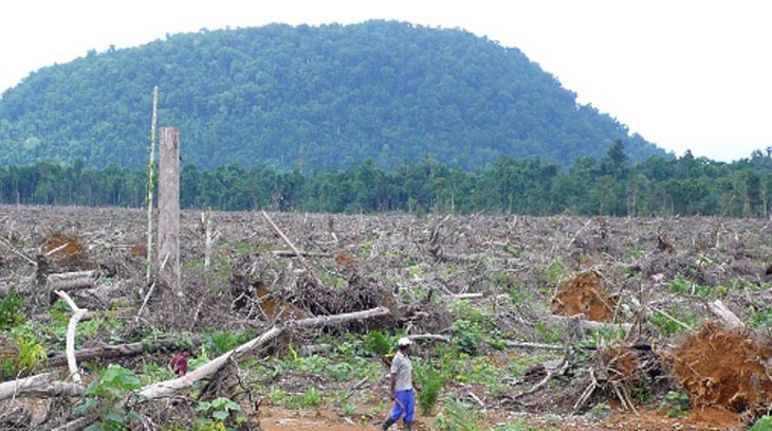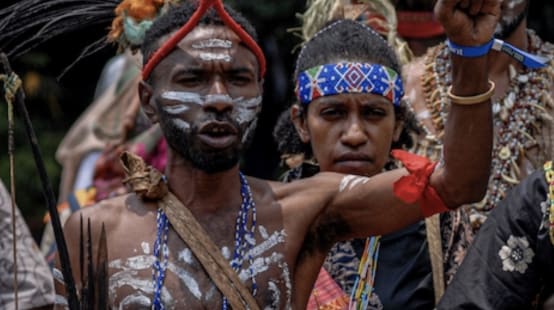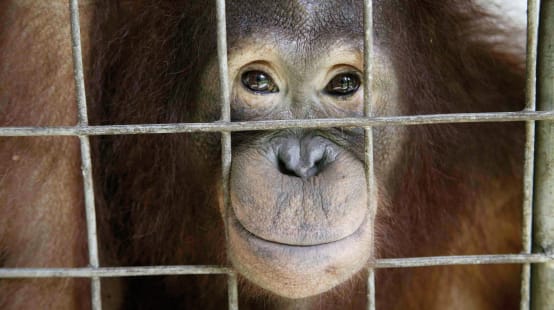Palm oil for power stations in Hawaii threatens forests and communities
 Palmoil plantations destroy forests
Palmoil plantations destroy forests
HECO (Hawaiian Electric Company), the largest electricity company in Hawaii, could soon become one of the largest US importers of palm oil. They have been given permission to burn 2.56 million gallons of palm oil in two large power stations for a 'test phase' – and they want to burn far more after that. HECO's so-called 'clean energy' will mean more deforestation and land-grabbing in South-east Asia and West Africa, and more climate change. Please call on the state government of Hawaii to withdraw the permit and not to allow HECO to burn palm oil or other agrofuels.
Call to action“”
HECO (Hawaiian Electric Company), the largest electricity generator in Hawaii, could soon become one of the largest US importers of palm oil. HECO has been planning to burn palm oil in power stations since 2006 and this summer they were granted permission to burn 2.56 million gallons of it in two power stations. Unless the state government and authorities change their mind, this will only be the beginning of much larger palm oil use in Hawaiian power stations and HECO will become one of the biggest palm oil users in the Americas.
HECO's so-called 'clean energy' would mean more deforestation and land-grabbing in South-east Asia and West-Africa and more climate change. The palm oil will be supplied by Sime Darby one of the world's largest palm oil companies, with very large plantations, mostly in Malaysia and Indonesia and with big expansion plans in Indonesia and West Africa.
A 2007 report by Greenpeace showed that Sime Darby has been directly involved in the destruction of rainforests and peatlands, including orangutan habitat for palm oil . The company has been responsible for violating people's rights and creating land conflicts in Malaysia and Indonesia. Indonesian NGOs have documented several of the conflicts and examples of rainforest destruction for which Sime Darby is responsible. Those include illegally clearing forests for plantations, destroying indigenous peoples' graveyards, reneging on promises to give land to smallholders, clearing forests in protected river and coastal 'buffer zones', and inhumane working conditions. In one case, a Sime Darby subsidiary in Sumatra forced plantation workers to continue working despite severe flooding. After a couple, parents of three children went missing, the company withheld wages from workers who had joined a search party for them. The couple were found to have drowned.
Unbelievably, US conservation organisation Natural Resource Defense Council has agreed a 'sustainable sourcing policy' for palm oil with HECO and allows them to class palm oil from Sime Darby as sustainable.
Regardless of where HECO gets their palm oil from, more demand will, directly or indirectly, mean more plantation expansion and thus more deforestation, land conflicts and evictions. In 2007, the Indonesian civil society organisation Sawit Watch wrote an open letter to the government and people of Hawaii, expressing their "deep concern over the policies being adopted which promote the use and import of biofuels as an alternative to fossil fuel " and stating: "Their disproportionate use is one of the new driving forces of large-scale and monoculture oil palm plantation expansion that contributes to global warming, social conflicts and rights abuses in producing countries, particularly Indonesia".
Please call on the government and authorities in Hawaii to immediately withdraw HECO's permit for burning palm oil and not to give them permission to burn any palm oil or other agrofuels in future. Instead Hawaii should invest in their abundant solar, wind, and wave energy resources, as well as energy efficiency and conservation measures. Please click here for more background information.
Your letter will be sent directly to leading politicians in Hawaii and to HECO. A copy of the letter with all the signatures will later be sent to the Natural Resource Defense Council.
See here our recent film report from Indonesia about rain forest destruction and human rights abuses by RSPO certified Wilmar International Ltd., the world's biggest palm oil company. The report also reveals that the Round Table on Sustainable Palm Oil (RSPO) and the label are pure greenwashing: The sustainability Lie - How the palm oil industry is deceiving the world.
BackgroundHECO, the largest electricity company in Hawaii, has been pursuing plans for generating electricity from palm oil since at least 2006. This summer, they succeeded in obtaining the first two palm oil permits from the state government's Public Utilities Commission (PUC).
The PUC's decisions came after strong protests against HECO's palm oil plans from local and national NGOs and also from Sawit Watch in Indonesia. The plans involve two 'Demonstration Projects': One at the 651 MW Kahe Power Plant on Hawaii island, where HECO will burn 1.575 million gallons of palm oil over one month, the other at the 212 MW Ma'alaea Power Plant on Maui island, where 1 million gallons of palm oil biodiesel will be burned. If those tests are technically 'successful' (which can be expected), then HECO will apply for a full permit for burning far greater amounts of palm oil every month.
All of the palm oil will be supplied by the Malaysian plantations and investment firm Sime Darby under a 'sourcing policy' drawn up between HECO and the National Resource Defense Council (NRDC), which has been strongly criticised for greenwashing palm oil and other agrofuels as 'sustainable'.
Sime Darby is one of the world's largest palm oil plantation firms, with over 630,000 hectares of plantations, mostly in Malaysia and Indonesia and with major oil palm expansion under way in Indonesia and West Africa. A 2007 report by Greenpeace showed that Sime Darby has been directly involved in the destruction of rainforests and peatlands, including orangutan habitat for palm oil (tinyurl.com/57cxw5). According to the Malaysian Nature Society: "Sime Darby has a substantial number of on-going cases of social conflict in both Sarawak and Kalimantan...they have not demonstrated leadership on addressing conflicts as would be expected from the self-claimed 'sustainability leader'. In fact, their track-record in plantations and social conflicts makes the tag-line ironic humour" (tinyurl.com/39smgwj ). A report by WALHI (Friends of the Earth Indonesia), CELCOR (Friends of the Earth Papua New Guinea) and Sawit Watch – illustrates, amongst others, two examples of land conflicts for which Sime Darby is responsible: In February 2008, the Indonesian Audit Board reported that [Sime Darby subsidiary'] PT Ladang Rumpun Subur Abadi had cleared and planted 1,460 hectare (including 250 ha supposedly protected forest) of forestry plantations for transmigrants. As recently as 11 May 2009, the community of Bakau reclaimed 211 hectares of planted area by [Sime Darby subsidiary] PT Swadaya Andika because they had been waiting for the company to establish [land rights for] smallholders since 2001." (tinyurl.com/33uf7u9 )
As hundreds of groups worldwide have said: Palm oil monocultures can never be sustainable. Wherever HECO gets their palm oil, or for that matter any other agrofuels from, the global demand for palm oil and vegetable oil in general is already entirely unsustainable and creating yet another demand will mean more plantations at the expense of forests, communities and climate.
In 2007, Indonesian civil society organisation Sawit Watch wrote an Open Letter to the government and people of Hawaii, expressing their serious concerns about HECO's palm oil plans and stressing that palm oil (or for that matter soya) biodiesel could never be sustainable or 'climate friendly' (tinyurl.com/3xdktqm).
Dear Sir/Madam,
I was deeply concerned to hear that the Public Utilities Commission has approved HECO's applications for biofuel 'demonstration projects' at the Kahe and the Ma'alaea Power Plants. Those will involve burning a total of 2.56 million gallons of palm oil supplied by Sime Darby, a plantation company shown to have been directly responsible for ongoing rainforest and peatland destruction in South-east Asia as well as for serious land conflicts. Sime Darby is rapidly expanding oil palm plantations in Indonesia and in West Africa.
If the 'tests' are technically 'successful', this is expected to pave the way for a much larger application for palm oil burning in both power stations, which, if granted, would turn HECO in one of the largest US importers of palm oil.
Hundreds of groups worldwide have said: “The cultivation of oil palms, like all other industrial monoculture plantations, is not and never will be sustainable” ( tinyurl.com/cm2l4k). Regardless of where HECO get their palm oil, or for that matter any other agrofuels from, the global demand for palm oil and vegetable oil in general is already entirely unsustainable and creating yet another demand will mean more plantations at the expense of forests, communities and climate. A new demand for palm oil will, directly or indirectly, mean more destruction of tropical forests and peatlands, more displacement of local communities, including indigenous peoples and other forest-dependent people, more pesticide poisoning and pollution of soil and water, and more climate change.
The 'sourcing policy' agreed between HECO and the National Resource Defense Council (NRDC), as well as the Roundtable for Sustainable Palm Oil, offer nothing but greenwashing for highly destructive plantations and plantation expansion. I am aware that HECO's palm plans have long faced strong local, national and international opposition. In 2007, the Indonesian civil society organisation Sawit Watch wrote an open letter to the Hawaiian government and people expressing their serious concerns about HECO's palm oil plans and the impacts those will have on communities and forests in Indonesia and on the global climate (tinyurl.com/3xdktqm).
I therefore call on you to immediately withdraw the permits for the Kahe 3 Biofuel Co-firing Demonstration Project and for the Maui Electric Company's Biodiesel Demonstration Project at Ma'alaea Power Plant and not to grant any further permits involving palm oil or any other agrofuels to HECO or their subsidiaries. Instead Hawaii should invest in their abundant solar, wind, and wave energy resources, as well as energy efficiency and conservation measures.
Yours faithfully,













 Recent successes
Recent successes